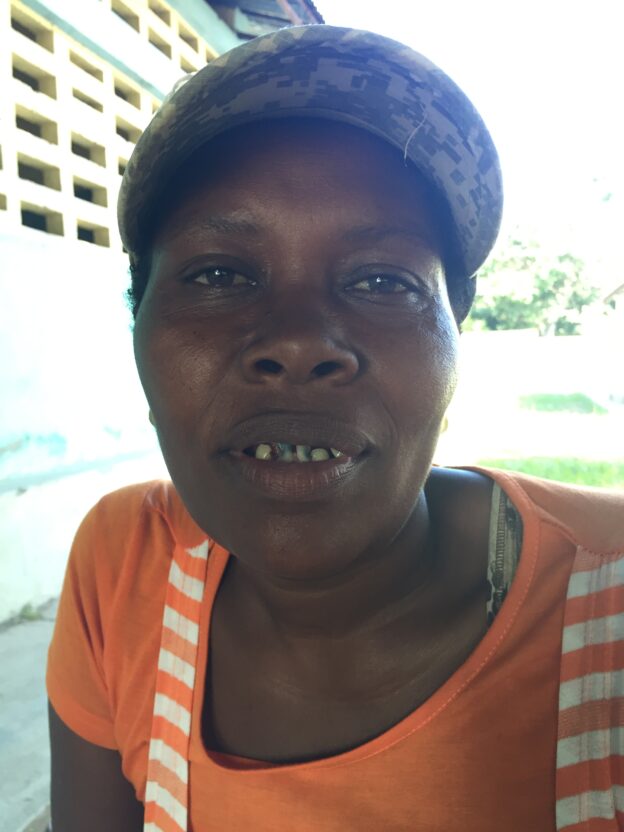Marijo lives with her three children in Ranp Solda, near the main highway that cuts north-south through Central Haiti, just north of Kanj. She’s been a widow for several years, though her partner had stopped helping her support their children even before he passed away. “I’ve been both their mother and their father for a long time.”
She and her sister had both been mentioned among the community’s poorer residents at the public meeting that launches the CLM selection process, but when the team set out to interview potential members, they couldn’t find them. They living in Pòtoprens. She had left her two younger children in the care of her oldest child, a teenage boy, to work as a maid. It was the only way she could figure out to pay their rent, keep the kids fed, and send them to school. Her sister was working as a maid as well.
A CLM case managers talked to the kids about their lives and about their mothers, and he thought both women might qualify for the program. He got the kids to give him their phone numbers, and called them. Once he had convinced himself that they would qualify, he encouraged them to come home to Tomond to attend a meeting. “He asked me whether I’d rather live at home or in Pòtoprens, where I was working, and I said I wished I could see how my children sleep every night and how they wake up every morning.”
Marijo’s sister decided to stay in Pòtoprens. Marijo explains that the sister had a boyfriend at the time and wanted to stay near him. The man has, however, left her, so Marijo’s sister now has neither him nor the CLM program.
After attending the initial six-day training, Marijo chose goats and small trading as her two enterprises. And her goats have done well. “They gave me three, but they’ve had kids. I would have seven, but one of the kids died. So there are six. Most of them are still small, but I count them anyway.” Her kids help her take care of them. “They move them around a couple of times a day to make sure they are near food and out of the sun.”
Her real success has come through her commerce, though. The CLM team gave her 2000 gourds — about $21.50 — which she used to buy four sacks of charcoal from various local farmers. Charcoal trucks drive by Ranp Solda every day on their way to Pòtoprens, and Marijo sold all four for 2400 gourds to a wholesaler on a passing truck. She could earn higher profit by selling the sack individually, to consumers, but she likes being able to get rid of them quickly. She’s been rolling over her investment ever since. She now buys 15 sacks, and has establish a relationship with a particular wholesaler who buys everything she has every two weeks. “I keep almost all the money in the business, except what I take out to pay into my savings group every week.”
She’s not planning to grow her charcoal business much larger than it is right now, though. She’d rather use additional profit to establish a second business. Her plan is to sell basic groceries out of her home. “That way, my kids won’t have to go to other people to buy what we need. I’ll just keep track of what we take out of the business and replace it.”
When I tell her that I can see she has a head for business, she smiles. She never thought of herself as someone who could go into business. “When they do trainings, they talk with you. Even if you never had thoughts about business, business thoughts come to you.”
She still doesn’t depend on business to feed her children, however. Instead, she found a job doing laundry for a family in Kanj. She washes once day a week and then irons the clothes on a separate day. The family pays her 1500 gourds per month, or about $16.25.
Her real focus now is on completing her new home. Paying her 4000-gourd rent every year has been one of her biggest challenges up to now. But she found a neighbor willing to rent her a small plot of land sou pri dacha. That means that the rent she’ll pay will work as installments towards eventual purchase, so she and her kids will have her own home. She doesn’t yet know how much the purchase will cost. The land’s owner said that she should just build her house and that they’d talk about the purchase price in the future. She hopes to be able to use her livestock to complete the purchase.
She decided to build very small house, just one room, because she wants to be sure she’ll be able to finish the job. The CLM teams provides some building materials, and stipends for the builders, but members have to acquire a lot of the stuff they need themselves. Marijo is almost finished. She just needs to have the front door made.
